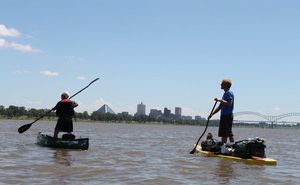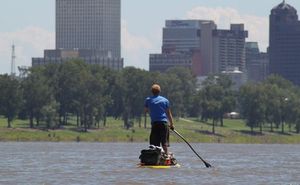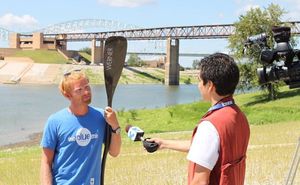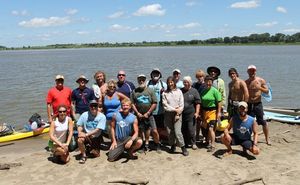Stand Up Paddle Expedition with Dave Cornthwaite
- Written by Staff
- Published in Journeys
- Comments::DISQUS_COMMENTS
Today's big read is about one man's extra big journey. Dave has been stand up paddling the Mississippi River for over two months now and is closing in on his goal of being the first person to SUP the Mississippi unsupported.
Read all about Dave's SUP Mississippi Expedition here and also a Q & A with Dave here.
|
Click here to go to Dave's Facebook Page
|
MEMPHIS, Tennessee - Dave Cornthwaite has been stand up paddling the Mississippi River for over two months now. His journey is a record setting attempt to be the first person to paddle the length of the river while carrying all he needs on his SUP. That means no boat, no support, just one man and all the gear he can carry with him.
So what is it like spending your days on the river and your nights discussing the latest news with the mosquitoes? Below, Dave breaks down his typical day on the mighty Mississippi and tells SUP Connect about his day of 77.2 miles in just under 14 hours, a new SUP distance record.
Dave Cornthwaite: I'd travelled along rivers before; the Amazon, the Nile, Australia's Murray, but never by SUP. This journey has been brewing for a while, withdrawal symptoms from river life slowly building up to a point where another expedition was inevitable.
I've been Stand Up Paddleboarding for two years and in that time have completed the first end-to-end SUP journey of Lake Geneva, and the first crossing of England by SUP, but 55 and 150 miles compared little to the 2400 mile length of the Mississippi.
Ever since I began adventuring I've been searching for simplicity, and it's tough to find a more simple form of touring than SUP; board, paddle, kit in dry bags strapped to the deck. The only working parts are in my body, which SUP just happens to make stronger as the journey goes on, so as long as the will is there and I'm sensible, then the expedition is a win-win.
My average day begins with a 05:30 alarm. I'll snooze it once, maybe twice depending on the heat and yesterday's mileage. My alarm is my phone and Internet hub. My expeditions are centered around content sharing; of logistics, events, geography, environment and physical/ psychological effects, so I'll spend 15 minutes crossing off emails if there's signal.
Depending on my place of rest, whether it's an open sandbar or a wooded bank, I'll be in my tent or hammock. Both take two minutes to put up and take down, and have weathered a few storms already on this trip. A rainy night or dewy morning will usually mean a mid-morning dry-out session, and dictates how well I pack them up.
I'm carrying 85lbs of gear on my board, almost all contained within Aquapac and Palm drybags strapped to the front and rear of my Lakeshore River Rover paddleboard, which still sits high and drives through the water despite the load.
Half of the gear is electronics; Macbook pro 13", Canon DSLR, Sanyo waterproof camcorder, GoPro, Solar charger and battery, spare hard drives, wires and spare batteries galore. All of these are triple-bagged; I'd feel close to death if I lost the photos and videos from any trip!
I'm on the water by 7am at the latest. My daily target depends on whether there are any settlements on route, but the average has been 40 miles in recent weeks. During this summer's heat waves the temperature has been up in the 90's even at night, so it's lovely to get out on the water and feel the breeze. I'll paddle for an hour and when the sun starts beating I'll perch on my board and lather up with water and sweat-proof sunscreen before pushing through to the 10-mile mark.
These journeys are a numbers game, if I let the idea of paddling thousands of miles invade my thoughts I lose track of the minutes, hours, days and weeks that go into these expeditions. I won't look further ahead than half a day. Break down the distances, bit by bit, then I'll get there.
I'll start snacking at 9am and this continues through the day. Tins of fruit stored in a small cooler (ice is a valuable commodity and doesn't last long), Nakd wholefood bars, chocolate, beef jerky, nuts, always something different each break to keep me excited about eating!
Sometimes I'll pull over to the bank to snack especially if the river is volatile, but on calmer days when I have a big mileage ahead I'll sit or crouch on the board and drift for a few minutes. Big meals sit low in the stomach so I save them for the evening, but however much I eat I'll never repair the calories burned away by ten hours of standing and paddling.
The view is great from up here! I've kayaked thousands of miles but won't do that again. Travelling by SUP has rewarded me like no other form of transport, it’s pure freedom. The temperatures have pushed over 130 some days, record-breaking, and I'll take a dip two or three times a day, always wearing my pfd, always holding onto the board.
We take for granted the basic necessities of everyday life at home; running water, COLD water, regulated air, comfort. Out here I'm humbled regularly, twenty times a day, I'm just a small man in a big world, surviving and travelling, how we were designed to be.
As far as the Planet is concerned, my journey and my life are of no consequence and it's good to be reminded of this. The small things that once stressed me out: paying bills, going shopping, remembering birthdays - they don't really mean anything these days.
There's time to think on the water. I'll paddle non-stop, hard, for two hours solid, sometimes three before resting momentarily. It's transcendental. I'm in a trance part of the river and aware of everything nearby and on the banks, but constantly thinking. About my future, my past, how lucky I am, why ex-girlfriends are ex-girlfriends, how my family is. I know myself pretty well these days, how often do we really give ourselves time to think during a normal working week?
There is a science to packing up that has developed since the first day of the journey. After a week I discarded a few things, after two weeks everything had its place. A 75 liter dry bag behind me contains camping gear and tech. Forward from that is the cooler, food and at least two gallons of water (I don't carry a purifier, the River Rover can hold 300lbs and I can resupply often enough to keep everything fresh).
Just ahead of my feet is a Camelbak containing everyday stuff like phone, SPOT tracker (pings a marker to my website map at the push of a button), head torch, money etc.). On top of the Camelbak is a Garmin GPS that tracks my daily mileages and tells me how fast I'm going, which keeps me from getting lazy! In the bag up front are miscellaneous bits and bobs, like clothes and stickers for paddlers who join me, contact lenses and toilet paper, etc.
For one month I've been joined on the river by my friend Tom Evans. Having never paddled before he stepped onto a board in Minneapolis and has made it 1120 miles to Memphis, where I'm saying goodbye to him. Tom's efforts exemplify the beauty of SUP, it is rewarding, simple and open to all, however far they want to go and wherever they want to paddle.
On August 10th Tom and I were an hour later than normal setting off, not for any reason other than pure laziness! By 4pm we had paddled 50 miles and just as Tom revealed to me that he was feeling tired I hit him with a question: 'You might not like this, but how do you feel about going for a world record?' 'I hate you, but okay,' he said.
We pushed on, donning head torches as the sun fell. The waters were calm and a 5mph headwind didn't affect the surface too much, and although 700 foot barges were plowing the channel over to our right the moon was nearly full so gave us enough light to make it to New Madrid, MO, safely.
We finished 77.2 miles further downstream than our previous night's campsite, 17.7 miles further than the previous daily record set by Annabel Anderson. We'd been moving for 13 hours and 55 minutes, and the smile on Tom's face said it all, one month earlier he'd never set foot on a Stand Up Board and now he was breaking records!
I'm at home on the water now. I paddle between 8 and 10 hours on a normal day, burn up to 9000 calories in that time and consume around 7000. My last rest day was two weeks ago, before that another two weeks. I'm fitter than I've ever been, my finger joints are sore and I'm feeling the eventual fatigue that you'd expect after paddling for seven weeks solid.
This has been the journey of my life, I've never been more fulfilled, and with almost 1650 miles under my belt I have another 800 or so to go until I paddle right into the Gulf of Mexico in three and a half weeks. No two days have been exactly the same, but that makes a true adventure, especially along a river that, until this journey began, I'd never seen before.
For anyone thinking of taking a journey on a SUP, don't hold back, you'll remember it forever.
.

Staff
Submit your news, events, and all SUP info, so we can keep promoting and driving the great lifestyle of stand up paddling, building its community, and introducing people to healthier living.
Website: supconnect.com Email This email address is being protected from spambots. You need JavaScript enabled to view it.




